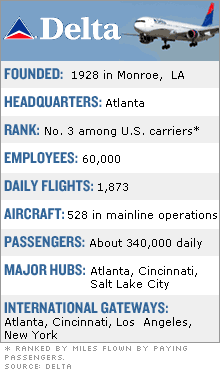|
Severance plan for Delta execs approved
Bankrupt No. 3 airline says it needs severance plan to keep senior managers; union says it stirs rank-and-file anger and bigger problems.
NEW YORK (CNNMoney.com) - A bankruptcy court Wednesday allowed Delta Air Lines Inc. to implement a severance plan for its senior managers, overruling objections by the troubled airline's pilots. Delta Air Lines and its pilots union had clashed over the company's plan to pay severance to its top officers and executives at the same time the airline is looking to cut wages and pension benefits for its workers.
The nation's No. 3 airline, which filed for bankruptcy court protection in September, said it wants to introduce severance packages, which could cost it up to $14.3 million, to help reduce the attrition rate among its senior managers, which had risen eight-fold in the last two years. But the Air Line Pilots Association, the only union at Delta, argued this is the wrong time for Delta (Research) to be seeking protection for top officers, when it is seeking further concessions from rank and file employees. It argued that the severance for top executives will hurt morale and could make a successful reorganization at the airline more difficult. Seeking 6 to 12 months of severance
The company argued in court filings that the plan is needed to stem the flood of top executives who have been leaving the airline due to uncertainty. It said unwanted departures among executives reached 11.9 percent of that staff in 2004 and 18.6 percent in 2005 as the airline's financial outlook worsened. Company officials stressed that Delta is offering the executives a severance plan that only pays those who are laid-off, not retention bonuses that have been controversial at other bankrupt companies. It also said the $14.3 million figure only applies to all the executives losing their jobs, and that a more reasonable estimate would be about a $3 million cost if 20 percent of the covered executives were laid off in a cost-cutting move. "In the first month of this year, four more of Delta's officers and directors resigned for other opportunities, including Delta's senior vice president-restructuring," said Delta in a filing asking for the program. "With each departure, institutional knowledge is lost, and Delta's remaining officers and directors are left with additional workloads and responsibilities." The airline also argued that the loss of those officers is costing it money, as it has to pay new hires to its officer ranks signing bonuses averaging $65,000, relocation fees averaging $23,000, and salaries averaging 20 percent above what was being paid to the departed employees. The airline argued that other employees at Delta have the airline's previous severance guidelines still in place and that only the officers lost protection at the time of the bankruptcy. And it said officers lost as much as 70 percent of their compensation when short and long-term incentive programs were eliminated at the time of the bankruptcy filing. CEO Gerald Grinstein and Chief Operating Officer Jim Whitehurst have declined to have the severance plan cover them. The plan has the support of the airline's creditors committee. Delta argued in its filing that even if every executive eligible for the program were to be laid off and paid the severance due to them under the program, it would cost less than $15 million, a small fraction of the company's overall liabilities. Union anger at plan
But the Air Line Pilots Association said this is the wrong time for such a plan. The union, which represents about 6,000 active and 500 furloughed pilots at Delta, held informational picketing at Atlanta Hartsfield Airport last week over the company's threat to use bankruptcy court to void the union's contract and the possibility that the airline will move to dump its pilots' pension plan on the federal government, a move that would cut promised retirement benefits for the pilots. "(Delta executives) are tone deaf to the effects of implementing a severance program for a select group on the remainder of the workforce," argued the union's filing. "At a time when Delta is proposing deep cuts in pilot wages and benefits, deep resentment and anger over a soft landing program for officers and directors can neither be understated nor should it be ignored. "Delta is critically dependent on the participation of its pilots for the success of its reorganization," the pilot's filing continued. "The parties' ability to reach a consensual restructuring agreement is already significantly challenged." The union said that if the court approves the severance plan, it could make it difficult to win rank-and-file ratification of any negotiated concession deal between the airline and the union. The pilots agreed to have their industry-leading wages cut by nearly one-third in October 2004 in an effort to keep the airline out of bankruptcy, a move that cut Delta's labor costs by about $1 billion annually. But rising fuel prices throughout 2005 finally brought about the September bankruptcy filing in spite of that concession. The pilots agreed to another interim pay cut of 14 percent last December, but a March 1 deadline looms; If management and the union can not reach an agreement on further cuts, their proposals will be submitted to a neutral panel. ALPA's unit at Delta has authorized a strike vote, sought a $10 million contingency fund from its international union and set up a strike center in preparation for a possible strike at Delta.
For FORTUNE's look at Delta's bankruptcy dogfight, click here. |
|

